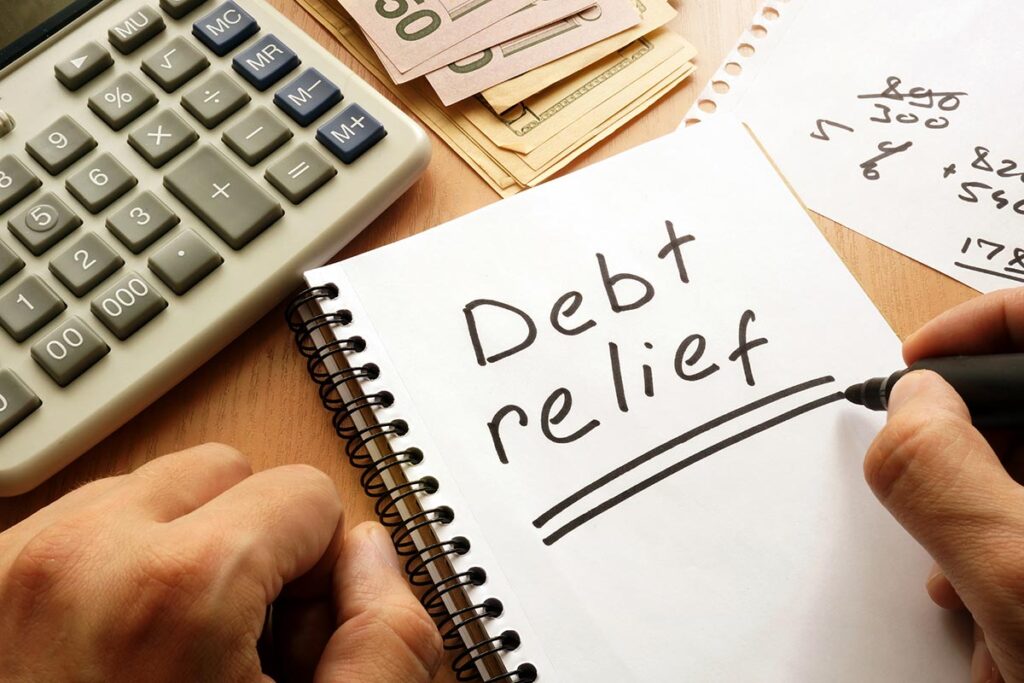According to a Federal Reserve report, total consumer debt rose to $16.9 trillion at the close of 2022. According to Business Insider, the average American has between $46,000-$96,000 in debt, depending on state and age. These numbers can seem too big to come back from, but with debt relief companies and debt relief options, there is hope.
In this article, we will share everything you need to know about ways to help get you out of debt. From debt relief companies to consumer credit counseling, getting back to good financial standing is possible.

What is Debt Relief?
Debt relief is the act of a borrower convincing a lender to reduce the amount of money they owe (debt) to an amount that the borrower can afford to pay, which is indicative of relief.
Debt relief can occur when a lender lowers the principal amount, the interest rate, or monthly payments. It could also come down to renegotiating the term length of repayment. No matter how you slice it, debt relief may give the borrower a feasible plan to get out of debt.
We’ll get to various debt relief options, but before that, let’s touch on debt relief companies. These companies can serve as an intermediary to negotiate with your lenders.
What Do Debt Relief Companies Do?
Debt relief companies are for-profit businesses that act on a borrower’s behalf to negotiate with lenders to reduce debt. The main goal of a debt relief company is to get a lender to lower the amount owed in exchange for debt settlement.
To do this, debt relief companies may have you stop making your payments. Instead, they may advise you to put that money into a savings account (which may incur fees). Then, the debt relief company will approach your lenders to negotiate repayment. They’ll do this using the money you’ve accumulated in the savings account.
What is Consumer Credit Counseling?
On the other hand, you may instead opt for consumer credit counseling. Consumer Credit Counseling Services (CCCS) agencies are all 501(c)(3) nonprofits. They aid consumers in managing their debt by providing free consultation and determining the best method to repay their debts.
Sessions may include budgeting assistance, action plans, credit report reviews, educational materials and workshops, and more.
Government agencies and programs, grants, and consumer fees support CCCS. They do this to provide free or relatively inexpensive services to the public.
When To Seek Debt Relief
If you’re in debt but are unsure of when the right time is to seek debt relief, consider the following:
- If your total unpaid unsecured debt is equal to 50% or more of your gross income, it may be time to seek relief
- If you feel hopeless about repaying your unsecured debt within five years, you may want to consider a debt relief option.
Debt Relief Options to Consider
There are a variety of debt relief options to consider, but the right plan will differ per person. Each plan is related to how much debt you owe and the interest rates on your debt.
Debt consolidation
Deb consolidation could be helpful if you have multiple loans or lines of credit to repay. With debt consolidation, you combine various debts into one. You could do this by taking out a personal loan or using balance transfers on credit cards. For example, if you have debt, you could open a low-interest or 0% interest rate credit card and transfer your debt balances to the card. Then, you repay the credit card company with the amounts you owe.
Debt management program
A debt management plan (DMP) is similar to debt consolidation. With a DMP, you work out a way to make only one payment (but this option doesn’t require taking out a loan or opening a balance transfer credit card). Instead, DMPs allow you to choose what debts to enroll in the program, and the payment is distributed across your creditors based on the plan. The upside is that you may receive better interest rates or a reduction of fees, but you’ll likely still end up paying the entire principal amount back that you owe.
Debt settlement
As one of the last available resort options, if you are past due on your payments, you could be able to make debt settlement work. Debt settlement means that you pay back your debts in full, sometimes for less than what you owe, granted that your negotiations go well. You can either negotiate directly with lenders to accept this option or hire a debt relief company to negotiate the settlement for you (remember, fees may be associated with the latter option).
Bankruptcy
Declaring bankruptcy could be another way to remove debts associated with your name; however, it may not be as good as it sounds. It can stay on your credit report for 7-10 years, depending on how much you owe when you declare bankruptcy. Bankruptcy may give you a second chance in your financial standing, but it shouldn’t be considered a first option.
Budgeting
Naturally, you can also manage your debts in the do-it-yourself method of budgeting and bringing down debt little by little. You’ll want to start by cutting expenses, making payments on time (and preferably for more than the minimum amount owed), asking companies to lower interest rates as you work on repayment, and hopefully increasing your income at the same time. Read this guide for more on how to pay back debts, even if you’re living paycheck to paycheck.

How to Choose the Best Debt Relief Company
Should you choose to work with a debt relief company, there are some critical factors to consider when deciding who to work with.
You’ll want to refer to the Better Business Bureau to review good and bad consumer reviews. Check the CFPB’s website to see any relevant complaints against the prospective company and use consumer review websites like Trustpilot.com to gauge the trustworthiness of the debt relief company.
The Federal Trade Commission (FTC) also recommends that you don’t choose a company who will collect fees before settling your debts.
The Bottom Line
If you’re carrying debt, you should prioritize paying it off as soon as possible. It is a doable feat with debt relief companies and debt relief options. However, if you are unsure where to begin, look up some Consumer Credit Counseling Services to see how they may assist you on your journey back to financial freedom.
High-interest loans can be expensive and should be used only for short-term financial needs, not long-term solutions. Customers with credit difficulties should seek credit counseling. The opinions expressed above are solely the author’s views and may or may not reflect the opinions and beliefs of the website or its affiliates. Cash Factory USA does not provide financial advice.
Image(s) or Footage (as applicable), used under license from Shutterstock.com.